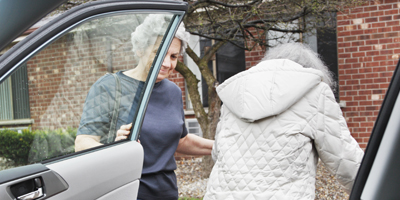Long-Term Care
If the person with Alzheimer's or other dementia prefers a communal living environment or needs more care than can be provided at home, a residential setting may be the best option. Different types of communities provide different levels of care, depending on the person's needs.
Types of residential care
Learn about the different types of long-term care to determine which one best fits the needs of the person living with dementia.
Retirement housing
Retirement housing may be appropriate for individuals in the early stage of Alzheimer's (sometimes referred to as the mild stage in a medical context) who are still able to care for themselves independently. This type of senior housing generally provides limited supervision and may offer opportunities for social activities, transportation and other amenities.
Assisted living (also called board and care, adult living or supported care)
Assisted living bridges the gap between living independently and living in a nursing home. It typically offers a combination of housing, meals, supportive services and health care. Assisted living is not regulated by the federal government and its definitions vary from state to state. Not all assisted living providers offer services specifically designed for people with dementia, so it is important to ask.
Nursing homes (also called skilled nursing facility, long-term care facility or custodial care)
Nursing homes provide around-the-clock care and long-term medical treatment. Most nursing homes have services and staff to address issues such as nutrition, care planning, recreation, spirituality and medical care.
Nursing homes have different staff-to-resident ratios and their staff members have various levels of experience and training. Nursing homes are licensed by the state and regulated by the federal government.
SCUs are designed to meet the specific needs of individuals with Alzheimer's and other dementias. SCUs can take many forms and exist within various types of residential care communities, including assisted living, and they may or may not be locked or secured units. Such units most often are cluster settings in which persons living with dementia are grouped on a floor or a unit within a larger residential care building.
Some states have legislation requiring nursing homes and assisted living residences to disclose their fees and list the specialized services their SCU provides, including a trained staff, specialized activities and ability of staff to care for residents with behavioral needs. Because laws vary, it is important to ask specific questions about what type of care is provided in an SCU to ensure that the level of care is appropriate for the person.
Life plan communities (formerly known as continuing care retirement communities or CCRCs)
Life plan communities provide different levels of care (independent, assisted living and nursing home) based on individual needs. A resident is able to move throughout the different levels of care within the community if his or her needs change. Payment for these types of services can include an initial entry fee with subsequent monthly fees or payment may be based solely on monthly fees.
When living at home is no longer an option
Get support
Join our ALZConnected online community and get advice and support from other caregivers facing similar situations.
There may come a time when the person living with Alzheimer's disease or dementia will need more care than can be provided at home. During the middle stages of Alzheimer's, it becomes necessary to provide 24-hour supervision to keep the person with dementia safe. As the disease progresses into the late-stages, around-the-clock care requirements become more intensive.
Making the decision to move into residential care may be very difficult, but it is not always possible to continue providing the level of care needed at home. The questions below may helpful when determining if a move to residential care is a good option:
-
Is the person with dementia becoming unsafe in their current home?
-
Is the health of the person with dementia or my health as a caregiver at risk?
-
Are the person's care needs beyond my physical abilities?
-
Am I becoming a stressed, irritable and impatient caregiver?
-
Am I neglecting work responsibilities, my family and myself?
-
Would the structure and social interaction in this setting benefit the person with dementia?
Even if you planned ahead with the person for a move, making this transition can be a stressful experience. You may feel guilty and wonder if you are doing the right thing. These feelings are are common. Families that have been through the process tell us that it is best to gather information and move forward. Keep in mind, that regardless of where the care takes place, the decision is about making sure the person receives the care they need.
Choosing a care setting
Find the right fit
Use our Community Resource Finder to search for local long-term care providers.
-
Plan to visit several care communities. Make an appointment for your first visit, but also make one or two unannounced visits. Look around and talk with the staff, as well as residents and their families.
-
When you visit a care community, ask to see the latest survey/inspection report and, in some states, the Special Care Unit Disclosure form — which they are required to provide. If it is a nursing home, you can go to Medicare’s Nursing Home Compare website to learn how it compares to the national average.
-
Visit the care setting at different times of the day, including meal times.
-
Ask the care provider about room availability, cost and participation in Medicare or Medicaid. Consider placing your name on a waiting list even if you are not ready to make a decision.
-
If payment will be out of pocket (or private pay), ask what happens if the person living with dementia runs out of money. Some communities will accept Medicaid, others may not. If you anticipate the need for Medicaid either now or in the future, plan to visit with a lawyer that specializes in elder care prior to moving into a care community to ensure a good financial plan is in place.
Questions to ask
When choosing a care community, there are a number of factors to consider, including the staff, the environment, the programs and the type of treatment provided. Consider asking the following:
Family involvement
- Are families encouraged to participate in care planning?
- How are families informed of changes in resident’s condition and care
needs? - Are families encouraged to communicate with staff?
Staffing
- Is medical care provided?
- How often are physicians and nurses or nurse practitioners on
premises? Is there a registered nurse on site at all times? - Is personal care and assistance provided?
- Is care personalized to meet specific needs, abilities and interests?
- Are staff trained in dementia care? Is it required by the state? How
long is the training and what topics are covered? - On average, how long have workers been on staff?
- How does staff handle challenging behaviors?
- What is the ratio of residents to staff?
Programs and services
- Are appropriate services and programming (e.g., small groups, quiet
rooms) available based on specific health and behavioral care needs? - Do planned activities take place? (Ask to see an activity schedule; note
if the activity listed at the time of your visit is occurring.) - Are activities available on the weekends or during evenings?
- Are activities designed to meet specific needs, interests and abilities?
- Is transportation available for medical appointments and shopping?
- Are care planning sessions held regularly? Are they held at convenient
times? - Which therapies (e.g., physical, occupational, speech, recreational) are
offered? - Is there a dementia-specific (special care) unit?
- Are religious services and celebrations available to residents?
Residents
- Is personal care (e.g., bathing, grooming, toileting) done with respect
and dignity? - Is there flexibility in personal care times based on an individual’s
schedule? - Are residents comfortable, relaxed and involved in activities?
- Are residents well-groomed, clean and dressed appropriately?
- What is the rate of falls?
- Are residents with psychiatric illness as their primary diagnosis on the
same unit as residents with dementia?
Environment
- Is the setting free of unpleasant odors?
- Do indoor spaces allow freedom of movement and promote independence?
- Are indoor and outdoor areas safe and secure? Are they monitored?
- Is the setting easy to navigate?
- Is there a designated family visiting area or a private place to have visitors?
- Are resident rooms clean and spacious?
- Are residents allowed to bring familiar items (e.g., photos, bedding, a chair)?
Meals
- Are there regular meal and snack times?
- Is food appetizing? (Ask to see the weekly menu and come for a meal.)
- Is there flexibility in meal times based on the individual’s personal
schedule? - Is the dining environment pleasant and comfortable?
- Are family and friends able to join at mealtime?
- Does staff have a plan for monitoring adequate nutrition?
- Is staff able to accommodate special dietary needs (e.g., low sodium,
diabetic)? - Do staff provide appropriate assistance based on person's abilities
(e.g., encouragement during meals or assisted feeding if needed)? - Are there any environmental distractions during meal time (e.g., noisy
TV)?
Policies and procedures
- Are family and friends allowed to participate in care?
- Do the visiting hours work for the family?
- Has the discharge policy been discussed? (Learn about any situation or condition that would lead to a discharge from the care provider, such as change in behavior or financial circumstances.)
- Is continuing care available as a resident’s needs change?
- Is there an “aging in place” policy where residents can remain in the
community — even the same room — throughout the course of the
disease? - Does the community provide an escort to the emergency room if a visit
is required due to illness or an accident? - Does the community provide end-of-life care? Is hospice care
available if needed?
Costs
Most families pay for long-term care costs out of their own pockets. Types of benefits that may cover nursing care include long-term care insurance (check the policy as certain requirements may need to be met before receiving benefits), Veterans benefits and Medicaid.
Medicare does not cover the cost of residential in a care community. Medicare only covers short-term skilled care after a hospital stay.
*Source: Genworth. Cost of Care Survey: National Median Costs.
Help is available
Alzheimer's Association 24/7 Helpline care consultants can help you with long-term care decision-making and provide you support. Call us at 800.272.3900 or visit our online Community Resource Finder tool.
Medicare's Nursing Home Compare provides detailed information about the past performance of every Medicare and Medicaid certified nursing home in the country.
Argentum offers information about assisted living, a checklist of questions to ask when considering residential care and a provider directory to identify options in a particular area.
The National Long-Term Care Ombudsman Resource Center provides information about federal ombudsman or advocates for residents of nursing homes, board and care homes and assisted living communities. Ombudsmen provide information about how to find a provider and what to do to get quality care.
Joint Commission on the Accreditation of Healthcare Organizations (JCAHO) website allows you to search for accredited residential care settings. An accredited provider is a nursing home or assisted living that meets very high standards of care set by JCAHO.
Related Pages

The Alzheimer’s Association is in your community.
Find Your Local Chapter
Connect with our free, online caregiver community.
Join ALZConnected




